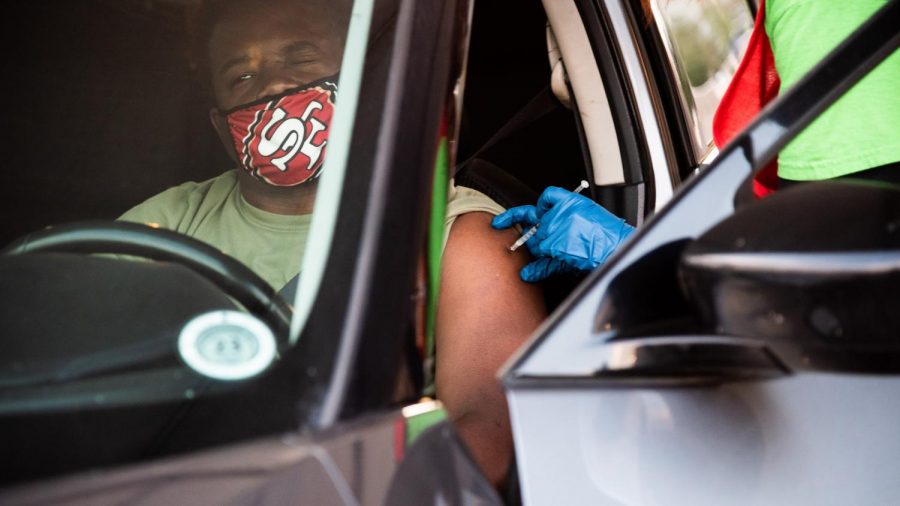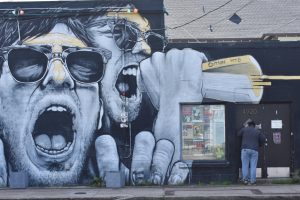COVID-19 vaccinations are underway at Loyola
Bobby Peters receives a vaccine at Oschner’s 24-hour, drive through Vaccine Fest on March 29. Moderna COVID-19 booster shots are available at Loyola’s booster shot fair on Nov. 13, 2021.
April 7, 2021
All members of the Loyola community are now eligible for COVID-19 vaccinations thanks to recent regulations that have opened up vaccine eligibility for everyone in Louisiana 16 years old or older.
Louisiana is only one of nine states, including Mississippi and Texas, that opened vaccinations for adults starting March 29. All 50 states will have open eligibility starting April 19.
“Loyola is certainly encouraging all our students to get vaccinated if possible,” said Patricia Murret, assistant director of public relations at Loyola. “Students have been enthusiastic about receiving the vaccine,” she said.
Loyola is partnering with Tulane’s School of Medicine which has offered its services to other universities to vaccinate eligible populations.
Loyola Student Health Services is also offering free COVID vaccines for all Loyola students. Students can reach out to Robin Watt in Student Affairs if they have questions about the process.
Students can also use VaccineFinder, an online service that can help people locate available vaccines nearby.
The university has also started a database for students to record their vaccination status in order for Loyola to track community vaccinations. Loyola began posting vaccination rates, and as of April 6, 325 faculty and staff members are reported to be fully vaccinated.
“We are all in this together, and we know it is critical for everyone with the capability to vaccinate as many members of the New Orleans community as possible and as quickly as possible,” Tulane said in a statement.
Residential assistants at Loyola such as Cynthia Russel have taken part in receiving vaccinations from Tulane University.
Russell, who is in her first year as a residential assistant, said getting the vaccine made her feel safer.
“The symptoms are just a little rough,” she said after taking her second vaccine shot.
Alicia Bourque, chief officer of Student Affairs, said residential assistants are classified as first responders and have been eligible to receive the vaccine since February.
Brealauna Leassear, also a residential assistant, said she decided to get vaccinated to not just protect herself but also her family, like her mom who is an elder and her uncle who has down syndrome and a compromised immune system.
Leassear said being a residential assistant increased her chances of possibly contacting the virus from others, and she could not risk taking it home to her loved ones.
Professors Alvaro Alcazar and Maggie Salib-Barrios are two of Loyola’s 314 faculty and staff members who have been fully vaccinated, according to Loyola.
Alcazar, professor of Latin American studies, said being a senior citizen and transplant patient placed him at a severe vulnerability to attract the COVID-19 virus. Receiving the COVID-19 vaccination reduced his stress substantially.
“It was the combined whispers of my guardian angel, my family, my butterfly friends, science, and the generous and compassionate stranger who donated my liver to me six years ago that motivated and inspired me to get vaccinated,” Alcazar said.
Alcazar received his vaccine from Ochsner Charity Hospital and said he looks forward to returning to on-campus classes.
Salib-Barrios, assistant professor in Loyola’s School of Nursing said that being a health care provider, she was able to receive the vaccine early on. She wanted to do her part to protect her family, friends and community.
“The shot itself was easy and relatively painless,” Salib-Barrios said.
She said getting the vaccine and continuing to wear her mask makes her feel more confident in public spaces.
“Getting vaccinated helps make the Loyola community a safer place by getting us back to our normal lifestyle on campus,” Salib-Barrios said, “The more individuals that get vaccinated, the less risk there is for another surge in cases.”







